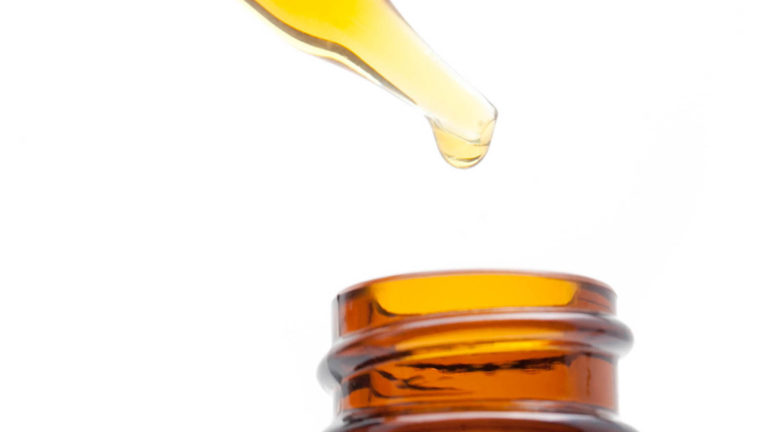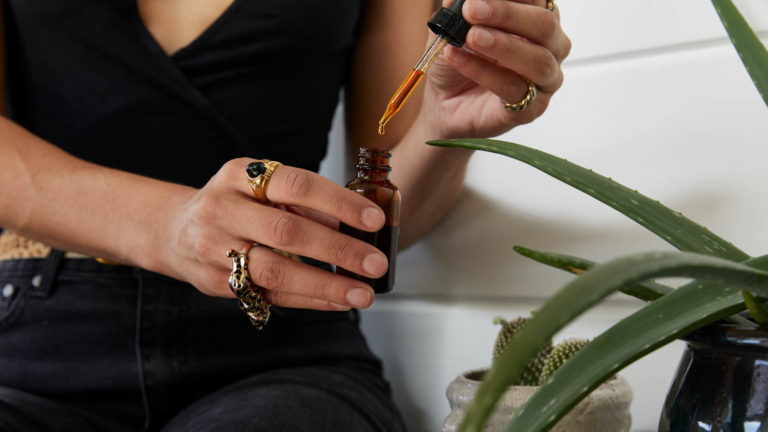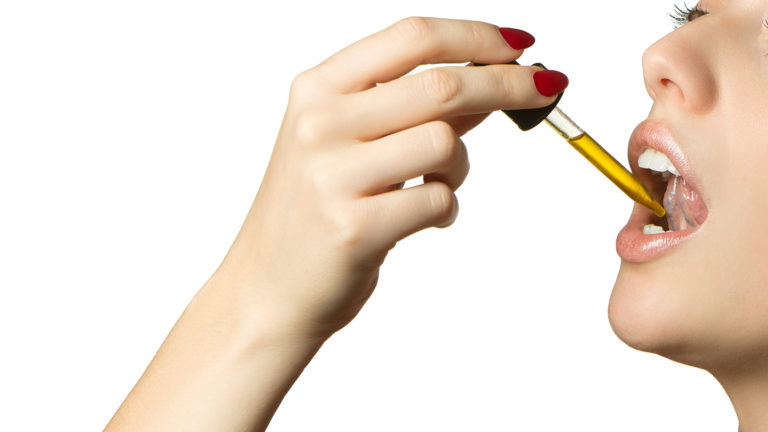Cannabidiol (CBD), the second-most prominent-cannabinoid found in the cannabis plant, has seen a meteoric rise in the wellness market for offering a wide variety of purported health benefits without causing intoxication or side effects.
 Photo by: Gina Coleman/Weedmaps
Photo by: Gina Coleman/WeedmapsImage lightbox

According to a 2019 survey from Gallup, 1 in 7 Americans, or 14%, use some form of CBD, mostly for medicinal purposes. As CBD's presence continues to grow, consumers and patients are becoming more curious about the ins and outs of this therapeutic cannabis derivative.
Despite the growing popularity of CBD products, there is still a fair amount of misinformation surrounding this non-intoxicating cannabis compound, prompting a need for more educational resources and guidelines for the average consumer. What is CBD? How does it work? Is it legal? What should consumers look for in CBD oil and other CBD products?
These are all important questions that a canna-curious consumer or medical patient may have. To help set you on a path toward an informed choice, here are 10 essential CBD facts that every potential and current CBD consumer should know.
1. CBD is legal, but only if it's derived from hemp
To anyone unfamiliar with CBD, it may seem strange to see something that comes from cannabis garner such widespread attention and acceptance across the U.S.. Following the passage of the 2018 Farm Bill, CBD derived from industrial hemp, defined as cannabis with less than 0.3% THC, is not a controlled substance under federal law. CBD from marijuana or hemp with more than 0.3% THC is still considered illegal federally, but legal in states where medical and adult-use cannabis is permitted. The laws vary significantly from state to state, however, so it's best to double check. For example, Idaho and South Dakota still consider CBD illegal.
2. CBD is psychoactive, but also non-intoxicating
One of the major CBD selling points to come out of the compound's recent product boom is that the cannabinoid is both therapeutic and “non-psychoactive,” as opposed to the extraordinarily psychoactive THC. While you might commonly read this “fact” about CBD, it isn't accurate to say that CBD is devoid of any psychoactive effects.
CBD is psychoactive in the sense that it directly affects mental processes of cognition and mood. CBD's most well-known psychoactive effect is the calming feeling frequently associated with the cannabinoid. CBD is, however, non-intoxicating, which means it doesn't produce the “high” of THC. THC is also psychoactive, but because its effects can leave consumers temporarily impaired, it is intoxicating. The non-intoxicating qualities of CBD are what cause some to consider it a “non-psychoactive” cannabinoid.
 Photo by: Gina Coleman/Weedmaps
Photo by: Gina Coleman/WeedmapsImage lightbox

3. CBD generally works better with other cannabis compounds
A 2015 study from The Hebrew University of Israel documented the medicinal potency of single-molecule CBD extract versus that of a whole-plant, CBD-rich extract. Single molecule extract is an isolated extract of a single compound, such as CBD. A whole-plant extract essentially preserves the full cannabinoid and terpene profile of the original plant.
The study concluded that whole-plant, CBD-rich extract had a superior therapeutic value to single-molecule CBD extract. Though there may be cases, depending on an individual patient's condition and physical restrictions, where a CBD isolate is a more appropriate prescription, a whole-plant, high-CBD product has the advantage of working in tandem with other potentially therapeutic cannabinoids and terpenes. This synergistic relationship is commonly referred to as the entourage effect. For instance, some studies have demonstrated CBD's ability to minimize the undesirable effects of THC, including paranoia and cognitive impairment.
4. CBD interacts with several systems in the body
One major explanation for CBD's wide range of potential benefits is the complex way it interacts with our bodies, particularly through the endocannabinoid system (ECS), an internal system made up of endogenous cannabinoids, or endocannabinoids, the receptors that these cannabinoids bind to, and the enzymes that break them down. CBD and other phytocannabinoids, or cannabinoids produced by the cannabis plant, bind to cannabinoid receptors when they enter the body, and elicit a wide range of effects, depending on which receptors they activate.
Research suggests that CBD may reduce absorption of the body's pain-regulating endocannabinoid anandamide, which could lead to pain relief. CBD has also been shown to reduce epileptic seizures by inhibiting the release of neurotransmitters.
CBD also elicits therapeutic responses from the body through non-ECS receptor pathways. For example, CBD may activate serotonin receptor 5-HT1A in mice, making it potentially helpful in treating depression and anxiety. It may also suppress chronic pain and inflammation by targeting alpha-3 glycine receptors according to research conducted on rodents.
5. Not all CBD oil is the same
Those who have had limited experience shopping for CBD oil may wonder where to start, or how to find a quality product. Firstly, understand that marijuana and industrial hemp are both common CBD oil sources. There are also several types and formulas on the market, which typically fall into one of three categories:
- Full Spectrum contains the full spectrum of CBD, minor cannabinoids, cannabis-derived terpenes, and trace amounts of THC found in the plant.
- Broad Spectrum contains a full spectrum of extracted cannabinoids and terpenes, but with trace amounts of THC removed.
- Isolate is pure CBD with all other cannabis compounds removed until only a powdered or crystalline form of CBD remains.
 Photo by: Gina Coleman/Weedmaps
Photo by: Gina Coleman/WeedmapsImage lightbox

In addition, it's also important to note that not all CBD oils and CBD-infused products are created equal. Although some reputable CBD companies adhere to strict labeling standards, subpar or falsely advertised CBD products with vague labels with buzzwords like “pure,” “all-natural,” and “organic” can be deceiving. Also beware of products labeled as hemp oil or hemp seed oil, which usually do not contain any CBD at all. As the FDA begins to crack down on CBD oil labels with unproven claims, consumers should still be on the lookout for the following on all CBD oil labels:
- Amount of active CBD per serving
- Supplement Fact Panel, including other ingredients
- Net weight
- Manufacturer or distributor name
- Suggested use
- Distinction as full spectrum, broad spectrum, or isolate
- Batch or date code with a link to the laboratory results for that batch. If the product wasn't lab tested, don't buy it.
6. CBD dosing isn't an exact science yet
When it comes to finding the most effective CBD dosage for a specific condition, there is no exact measurement or universal guideline that works for everyone. Part of the reason may have to do with the fact that genetic mutations of our cannabinoid receptors cause variances in the way a body reacts to CBD. If you, for example, are walking around with a different CB1 receptor variation than your friend, the two of you may react differently to the same dose of CBD. In other words, an effective CBD dose for one patient may not work for another. There are several other factors that determine the effectiveness of a CBD dose, including the product itself, the method of consumption, as well as the patient or consumer's physiology.
7. CBD is generally safe
So, if we're unable to figure out what dose is most effective for treating most ailments, where does that leave the user who doesn't have experience with CBD? Fortunately, it's easy to simply start with small doses and slowly work toward higher ones. Why? Because a 2011 study and a 2017 update show that CBD has what clinicians call a 'favorable safety profile,' due to the fact that it doesn't change major factors like heart rate, blood pressure, or body temperature and it doesn't affect psychological functions. It's also been proven that doses of up to 1,500 milligrams per day are well tolerated, even over long periods of time. However, some subjects from several CBD-related studies have reported side effects of CBD use, including extreme sleepiness, decreased appetite, diarrhea, fatigue, convulsions, and vomiting. There is also evidence that CBD can interfere with certain prescription medications so it's best to check with a doctor or pharmacist before mixing oral CBD and prescription drugs.
8. CBD may effectively treat anxiety
Although the most effective CBD dosing can be difficult to pin down, mounting research is starting to give us a better idea of how to best use this non-intoxicating cannabinoid. For example, a study published in the February 2019 issue of “Brazilian Journal of Psychiatry” found that CBD may be useful for treating social anxiety associated with public speaking. The research team gave subjects doses of CBD ranging from 150 to 600 milligrams, as well as a placebo, prior to a public speaking challenge. The study seemed to indicate that 300 milligrams helped alleviate anxiety-related symptoms.
 Photo by: Gina Coleman/Weedmaps
Photo by: Gina Coleman/WeedmapsImage lightbox

9. CBD is generally safe and therapeutic for dogs
CBD can help treat arthritis, seizures, and other health issues found in dogs. CBD oil may also support a dog's immune system, promote a shiny coat, and even improve breath odor. More research is needed to determine how effective CBD is for dogs, cats, and other pets, but existing evidence shows that CBD may provide a treasure trove of benefits to man's best friend.
10. It's legal to fly with hemp-derived CBD, but risky
While hemp-derived CBD items are legal under federal law, some individual states and cities still have stricter laws. In rare but documented cases, local law enforcement officers have arrested and charged people flying with CBD products. Marijuana-derived CBD products, as well as CBD products with more than 0.3% THC, are still not allowed on domestic or international flights. Ultimately, flyers carrying CBD are at the mercy of the TSA. On April 20, 2019, the TSA posted the following on Instagram: “Let us be blunt: TSA officers do not search for marijuana or other illegal drugs. [...] But in the event a substance appears to be marijuana or cannabis infused product, we're required by federal law to notify law enforcement.”
Major contributions from Dr. Adie Rae.

